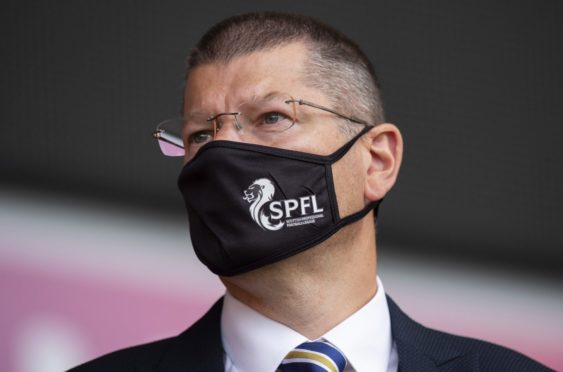
The United States is not the only country where the outcome of a vote will be discussed and dissected this week.
The Americans go to the polls on Tuesday to decide if Donald Trump carries on, or Joe Biden replaces him.
More than 70 million have already made up their minds, and posted their ballots.
In Scotland, meanwhile, the numbers the SPFL have to reflect on are a little less overwhelming.
The country’s 42 senior clubs were asked by the governing body for their views on possible contingency measures to deal with any further disruption caused by Covid-19.
Boiled down, their seven-part questionnaire read: “Are you now prepared to give us the power to call or void the leagues as we see fit?”
“Now” is the significant word.
The governing body originally tried to get a similar resolution through back in July.
At that time, the rank-and-file clubs – still witnessing the fury of Hearts, Partick Thistle and Stranraer on being relegated with games still to play – were not having it.
Since then, the League have revealed several of the “No” voters have been in touch to say they have flipped their position to “Yes”.
In a communique – sent by e-mail – accompanying the survey, SPFL Chief Executive Neil Doncaster’s frustration about the status quo is laid out for all to see.
His opening sentence references clubs and commentators continuing to suggest the SPFL Board “do something” to avoid the “division and uncertainty” which occurred towards the end of the curtailed 2019-20 campaign.
Stating: “No-one wants to see that repeated”, Doncaster insisted that a rule change was the best plan of action, so that everyone would know where they stand.
The votes are already in. Last Friday was the deadline.
With time needed to break down and assess the responses, it won’t be until some time this week that we learn what happens next.
Commonsense suggests the League will get their way, and be handed the power by the clubs to handle whatever the pandemic throws at the game. As mentioned earlier, the numbers are small enough to be coped with using simple mental arithmetic.
To get the new resolution in they need, as with all SPFL votes, the backing of 75% of the members at each level.
That is nine of the 12 Premiership clubs, 8 of the 10 in the Championship and a combined 15 out of 20 for League One and League Two.
The SPFL Board know how many have said they have changed their minds, so it is fair to assume they have gone back in again, confident of success.
It is not hard to understand why clubs have changed their positions over the last few months.
Dundee United owner, Mark Ogren, gave a good insight into the difficulties of trying to balance the books during Covid-19 last week.
Speaking as it emerged the Tannadice club were in talks with their players about wage deferrals or cuts, the American admitted they had not budgeted for supporters being kept out of grounds beyond October.
“How can businesses continue to operate when customers are banned?” was his simple question.
Ogren’s concerns are shared by everyone in the Scottish game.
Rangers, Celtic, Aberdeen and Hibernian have all already taken similar action to reduce their wage bills.
Of course, football clubs having money troubles is nothing new.
The financial meltdown of Rangers in 2012, plus the administrations of Hearts, Dundee, Motherwell and others filled countless pages of newspapers.
All impacted hugely on the staffing at clubs and, in particular, their playing squads.
If there was a common theme, though, it was that everyone involved was happier when they knew exactly where they stood.
If they were going to be moved on to raise funds, they wanted to know.
Likewise, if the budget was to be slashed and wages cut, telling players exactly what the plan was for the club to get back on an even keel allowed them to buy into – and feel part of – the solution rather the problem.
A perfect example is what happened at Dundee FC in 2010, when the club entered administration for the second time in seven years.
Manager Gordon Chisholm was made redundant and Barry Smith put in charge.
Having picked up a 25-point deduction, they looked certainties to be relegated to the old Second Division.
However, with an astonishing run of 23 league games unbeaten, they beat the drop, and Smith himself was rewarded with a long-term deal.
While it is unlikely the SPFL will be able to drum up quite such a show of unity from the clubs, a little of the one-for-all-and-all-for-one spirit in the face of continued Covid-19 disruption should be achievable.

Enjoy the convenience of having The Sunday Post delivered as a digital ePaper straight to your smartphone, tablet or computer.
Subscribe for only £5.49 a month and enjoy all the benefits of the printed paper as a digital replica.
Subscribe © Mhairi Edwards/DCT Media
© Mhairi Edwards/DCT Media